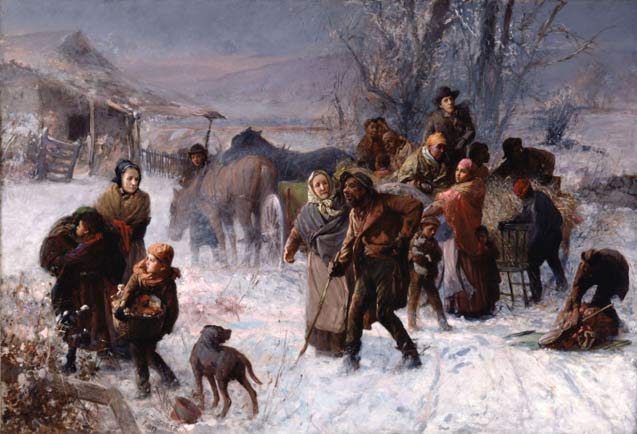 The Underground Railroad, 1893. (Image: Charles T. Webber)
The Underground Railroad, 1893. (Image: Charles T. Webber)
From slavery to Jim Crow to cities today, African-Americans have been leading the cooperative movement.
Cooperative economics and civil rights don’t often appear together in history books, but they should. From the mutual aid societies that bought enslaved people’s freedom to the underground railroad network that brought endangered blacks to the north, cooperative structures were key to evading white supremacy. And there was vicious backlash when black co-ops threatened the status quo.
“The white economic structure depended on all of these blacks having to buy from the white store, rent from the white landowner. They were going to lose out if you did something alternatively,” Jessica Gordon Nembhard, author of Collective Courage: A History of African-American Economic Thought and Practice, told Commonomics correspondent Laura Flanders this week.
For more on co-ops in the black community, read our latest piece on late Jackson Mayor Chokwe Lumumba’s vision.
Angry, shocked, overwhelmed? Take action: Support independent media.
We’ve borne witness to a chaotic first few months in Trump’s presidency.
Over the last months, each executive order has delivered shock and bewilderment — a core part of a strategy to make the right-wing turn feel inevitable and overwhelming. But, as organizer Sandra Avalos implored us to remember in Truthout last November, “Together, we are more powerful than Trump.”
Indeed, the Trump administration is pushing through executive orders, but — as we’ve reported at Truthout — many are in legal limbo and face court challenges from unions and civil rights groups. Efforts to quash anti-racist teaching and DEI programs are stalled by education faculty, staff, and students refusing to comply. And communities across the country are coming together to raise the alarm on ICE raids, inform neighbors of their civil rights, and protect each other in moving shows of solidarity.
It will be a long fight ahead. And as nonprofit movement media, Truthout plans to be there documenting and uplifting resistance.
As we undertake this life-sustaining work, we appeal for your support. Please, if you find value in what we do, join our community of sustainers by making a monthly or one-time gift.